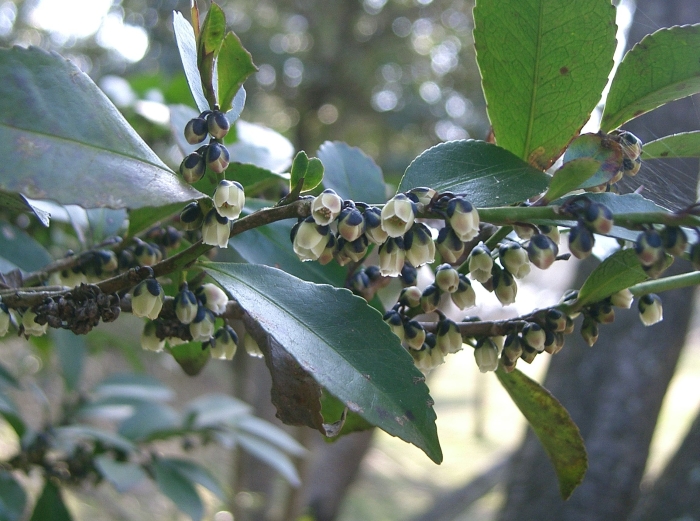East Asian Eurya
(Eurya japonica)
East Asian Eurya (Eurya japonica)
/
/

KENPEI
CC BY-SA 3.0
Image By:
KENPEI
Recorded By:
Copyright:
CC BY-SA 3.0
Copyright Notice:
Photo by: KENPEI | License Type: CC BY-SA 3.0 | License URL: http://creativecommons.org/licenses/by-sa/3.0/ | Uploader: KENPEI | Publisher: Wikimedia Commons | Title: Eurya_japonica4.jpg | Notes: {{Information |Description=Photograph of the {{MultiLink|Pearlbush}} ({{BioLinkSpecies|Exochorda racemosa}}). Photo taken [[:en:Tyler Arboretum|Tyler Arboretum]] where its species was identified.{{Ram-Man Camera 1 | camera = Nikon D50 | lens = Nik |

























Estimated Native Range
Summary
Eurya japonica, commonly known as East Asian Eurya, is an evergreen shrub or small tree native to the understory of temperate forests and woodland margins in Eastern Asia, including Japan, Korea, and China. It typically grows to a height of 5-6 feet (1.5-1.8 meters) and a width of 4-5 feet (1.2-1.5 meters), with a dense, rounded form. The plant features small, glossy, dark green leaves and produces tiny, bell-shaped white flowers in the winter and spring, which are subtly showy and may attract pollinators. The bark is smooth and gray, and although the plant does not produce notable berries or fruit, its evergreen foliage provides year-round interest.
East Asian Eurya is valued for its compact size, making it suitable for urban gardens, foundation plantings, and as a hedge or screen. It is relatively low-maintenance, tolerating a range of soil types, though it prefers well-drained soils. It can thrive in full sun to part shade conditions, and while it requires medium amounts of water, it is somewhat drought-tolerant once established. There are no widely recognized cultivars in the horticultural trade, but its natural form is well-regarded. Gardeners should be aware that Eurya japonica can suffer from leaf spot diseases and may occasionally be affected by pests such as scale insects.CC BY-SA 4.0
East Asian Eurya is valued for its compact size, making it suitable for urban gardens, foundation plantings, and as a hedge or screen. It is relatively low-maintenance, tolerating a range of soil types, though it prefers well-drained soils. It can thrive in full sun to part shade conditions, and while it requires medium amounts of water, it is somewhat drought-tolerant once established. There are no widely recognized cultivars in the horticultural trade, but its natural form is well-regarded. Gardeners should be aware that Eurya japonica can suffer from leaf spot diseases and may occasionally be affected by pests such as scale insects.CC BY-SA 4.0
Plant Description
- Plant Type: Shrub, Tree
- Height: 5-6 feet
- Width: 4-5 feet
- Growth Rate: Moderate
- Flower Color: White
- Flowering Season: Winter, Spring
- Leaf Retention: Evergreen
Growth Requirements
- Sun: Full Sun, Part Shade
- Water: Medium
- Drainage: Slow, Medium, Fast
Common Uses
Hedges, Low Maintenance, Street Planting
Natural Habitat
Understory of temperate forests and woodland margins in Eastern Asia
Other Names
Common Names: Eurya, 사스레피나무
Scientific Names: , Eurya japonica, Eurya japonica var. montana, Eurya coneocarpa, Symplocos fasciculata, Eurya roxburghii, Eurya japonica f. integra, Eurya japonica var. thunbergii, Eurya japonica var. angustifolia, Eurya japonica var. hortensis
GBIF Accepted Name: Eurya japonica Thunb.